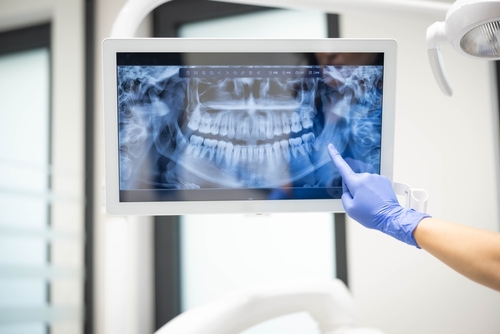Full-Mouth Reconstruction in Springfield, MO
“Reconstruction” may sound technical, but it really means giving your smile the care it needs to work in harmony again. In dentistry, full mouth reconstruction involves rebuilding the entire oral foundation. Instead of focusing on isolated concerns, we create a coordinated plan to restore health, balance, and function throughout the mouth. When we recommend full mouth reconstruction, we look closely at how the teeth, bite, gums, and bone are working together or where they may be out of sync. This approach helps us address several concerns at once and restore lasting strength and stability.
In our work, full mouth reconstruction centers on the three R’s: rebuild, renew, and restart. We rebuild what has been lost, renew what still holds potential, and restart your oral system so it functions comfortably again.
What Is Full Mouth Reconstruction?
Full mouth reconstruction is a comprehensive process that restores the health, function, and appearance of your entire smile. We may recommend this treatment when damage or disease is too extensive to fix with single, isolated procedures. Instead of addressing only individual teeth, we rebuild the entire dental foundation to bring back strength, stability, and proper function.
This approach is often best suited for individuals with advanced decay, gum disease, significant tooth loss, worn enamel, or bite problems that affect the overall function of the mouth.
What To Expect During Full Mouth Reconstruction
Diagnosis and Planning
Before we begin any part of full mouth reconstruction, we start with a detailed consultation. This first step lays the groundwork for safe, effective, and personalized care. During this visit, we evaluate your oral health, review your dental and medical history, and take diagnostic images using Cone Beam Computed Tomography (CBCT).
CBCT provides clear, three‑dimensional images of your teeth, jawbone, soft tissues, and nerve pathways in a single scan. With this advanced technology, we can view your complete oral anatomy, enabling accurate diagnosis and precise treatment planning.
By identifying existing issues and understanding how they connect, we create a tailored plan that guides every step of the process. Each phase of reconstruction works to restore strength, balance, and proper function while promoting long‑term oral health.
Preparatory Treatments
Once we’ve completed your diagnostic workup, we move on to any preparatory treatments needed to support your reconstruction. These procedures are introduced early in the process because they create a healthy and stable environment for the restorative phases that follow.
At this stage, we address any issues that could compromise the results of your treatment plan. This may involve removing teeth that cannot be saved or rebuilding areas of the jaw with bone or tissue grafts. In some cases, we perform a sinus lift to make room for dental implants.
If there are any signs of infection or gum disease, they should be treated during this phase. Healthy gums are essential for the stability of both natural teeth and dental implants. When left unaddressed, periodontal disease can lead to bone loss and create instability around restorations.
We tailor these steps to your specific needs, timing each one to give your mouth the best opportunity to heal and respond well to the next phase.
Tooth Replacement
This is the stage where your smile begins to take shape again. After laying a healthy foundation, we move forward with replacing missing teeth and restoring the natural appearance and function of your mouth. At this point, we begin placing restorations such as crowns, bridges, and dentures.
Dental implants are often one of the most effective solutions for tooth replacement. We place small titanium posts into the jawbone, where they integrate with the bone to provide lasting support for your tooth replacement. Unlike traditional options that rest on the gums or attach to neighboring teeth, implants replace the root and help preserve bone by maintaining healthy stimulation in the jaw.
Reduced bone volume is often present in patients requiring full-mouth reconstruction. For these cases, we often recommend mini dental implants. These implants are smaller in diameter and require less bone for placement.
Due to their size and versatility, mini dental implants expand the possibilities for patients who may not qualify for traditional implants. Mini dental implants allow us to restore missing teeth securely, even in cases where bone loss has occurred, making them a valuable option in this stage of care.
Follow-Up and Maintenance
Once your full mouth reconstruction is complete, we continue to support your care with routine follow-up and maintenance. These appointments include professional cleanings, detailed check-ups, and periodic evaluations to monitor the condition of your restorations and the surrounding structures.
Consistent follow-up allows us to detect any potential issues early and make minor adjustments if needed. This helps prevent future complications and keeps everything functioning as intended.
By maintaining these visits, you protect your oral health, preserve the integrity of your restorations, and stay on track with long-term results.
Explore What Full Mouth Reconstruction Can Do for You
If you’ve been living with chronic dental issues, multiple missing teeth, or discomfort that affects your ability to eat or speak, it may be time to consider a more comprehensive solution. Full mouth reconstruction offers a structured, long-term approach to repair the damage and restore lasting health. Schedule a free consultation to learn how we can help rebuild the foundation of your smile.
Frequently Asked Questions
The cost of full mouth reconstruction will depend on the condition of your teeth, gums, and jaw, as well as the type and number of procedures involved. We begin with a comprehensive evaluation to determine exactly what’s needed and provide you with a clear, personalized cost estimate.
Our team reviews your insurance benefits with you and explains what’s covered, helping you make informed decisions about your care. We also partner with trusted financing companies to offer payment options that fit your budget, making it easier to begin treatment without delay.
The longevity of a full mouth reconstruction depends on how well you maintain it. Daily oral hygiene, routine dental checkups, and avoiding habits like teeth grinding or chewing on hard objects directly affect how long your results will last.
With durable materials and advanced techniques, full mouth reconstruction is designed to be a long-term solution—often lasting for decades when properly cared for.
The length of the full mouth reconstruction process depends on the nature of your treatment plan. While some patients complete treatment in as little as three months, others may need up to a year.
Each phase is carefully planned to allow for proper healing and to ensure the best possible results. By approaching the process in stages, we’re able to restore both function and appearance in a way that supports long-term success.
Related Videos
- Health Factors to Consider Before Getting Dental Implants
- What Should I Expect at My First Implant Consultation?
- How Long Does a Dental Implant Procedure Take?
- What Is a Mini Dental Implant?
- Who Is Eligible for Mini Dental Implants?
- What If I Don’t Have Enough Bone for a Dental Implant?
- Do Mini Dental Implants Require Bone Grafting?
- Can I Replace a Missing Tooth in One Day?
- Can I Get a Tooth Pulled and a Dental Implant The Same Day?
- A Comprehensive Guide to the Mini Dental Implant Process
- Success Rates of Mini Dental Implants: What You Need to Know
- Are Mini Dental Implants Painful?
- Healing After Mini Implant Placement
- What Are the Advantages of One-Piece Implants?
- The Cost of Mini Dental Implants
- Payment Plans for Implant Treatment
- Different Types of Dentures: Which One Is Best For You?
- Who Qualifies for Implant-Supported Dentures?
- Solutions for Loose Dentures
- Can You Convert My Denture Into an Implant Denture?
- How Many Dental Implants Will I Need for My Implant Denture?
- Fixed vs. Removable Dental Implant Options
- Implant-Supported Dentures In a Day
- How To Care for Your Implant-Supported Dentures
- Implant Dentures Cost & Pricing Explained
- Does Insurance Cover Implant Dentures?

